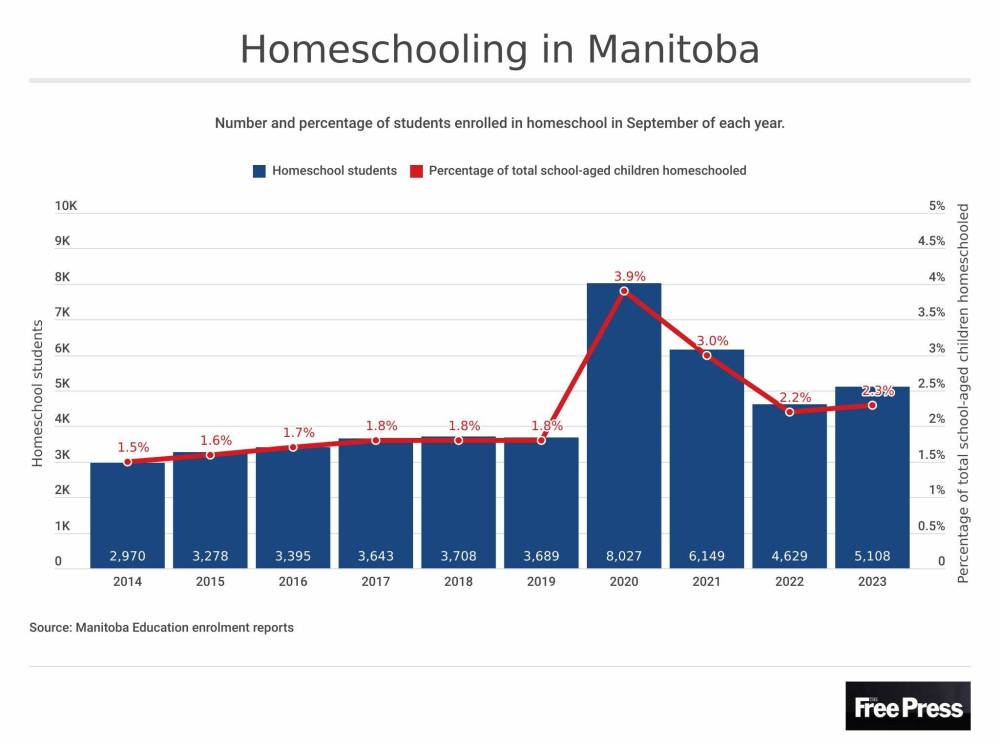Health concerns forced many Manitoba families to try homeschooling during the COVID-19 pandemic and new data suggests that trend is outlasting virus-related closures.
When kindergarten-to-Grade 12 schools fully reopened in the fall of 2020, the education department recorded a record number of more than 8,000 homeschool registrants.
That figure dropped substantially in September 2021 and September 2022.
Last year, per the newest enrolment report, it rose by 10 per cent, accounting for upwards of 5,100 children in total. While this group continues to represent a small minority of school-aged children, it includes about 1,400 students more than it did in 2019.

“If you schooled during the pandemic, you’ll know it was a hot mess and that’s no one’s fault,” said Heather Wickstrom, a mother of five students who will continue studying out of their Winnipeg home this fall.
“The online learning and getting sent home because someone was exposed and the testing and the shunning — there was just so much that happened in the school at that time so a lot of people pulled out just so they could avoid all of that mess … and a lot of people fell in love with (homeschooling).”
Wickstrom said the model has enabled her children to become more independent, there are plenty of meet-ups to socialize with other like-minded families on their own schedule, and the approach aligns with their faith and worldview.
She is a member of the Manitoba Association of Christian Home Schools, which the mother of five said has seen an “explosion” of interest in recent years.
“If you schooled during the pandemic, you’ll know it was a hot mess and that’s no one’s fault.”–Heather Wickstrom
Manitoba Education has a hands-off approach to homeschooling. Participants, who purchase their own curriculum materials, must simply inform the department about their intent to take teaching into their own hands. They are expected to submit biannual progress reports.
Owing in part to the growing popularity of homeschooling within its catchment, Winkler’s school board is partnering with the province to better support these families and ensure they can access public education resources if they so choose.
Garden Valley School Division representatives penned a letter to the province earlier this year to request funding for a homeschool liaison position.
“We want to be here as a support. We’re not an enforcer. We’re not trying to get into anybody’s homes … We’re here for families and that means all families and that’s really what the intent is,” said Leah Klassen, chairwoman of the board of trustees.
“We want to be here as a support. We’re not an enforcer.”–Leah Klassen
There are 561 homeschoolers in the division — the equivalent of 13 per cent of the total population in area public schools in Plum Coulee, Schanzenfeld and Winkler.
The board’s pitch is a two-year pilot to assist with liaising homeschoolers in order to link them with information about online learning, reintegrating interested families into the public school system on a part-time or full-time basis and related initiatives.
Education Minister Nello Altomare said he would like every early years student to get the opportunity to visit a public school and ensure all families know what the K-12 system has to offer.
“Ultimately, the public system is there to support families, to support Manitobans, and we want to make sure that these families know that because some of them had kids in kindergarten, Grade 1, Grade 2 and have never had a public school experience,” Altomare said.

RUTH BONNEVILLE / FREE PRESS FILES
Education Minister Nello Altomare said he would like every early years student to get the opportunity to visit a public school and ensure all families know what the K-12 system has to offer.
Garden Valley’s pilot could expand to other school divisions if it proves successful, the minister said.
Homeschoolers are disproportionately represented in Altona’s Border Land School Division and Steinbach-based Hanover School Division with about 280 and 1,000 attendees, respectively.
Those figures represent 13 per cent and 11 per cent of divisional enrolment statistics.
Winnipeggers Bethany and Dustin Booy welcomed the possibility of more support for families like theirs and others involved with the Manitoba Association for Schooling at Home.
“When you choose to go down the homeschooling road, you really are kind of on your own, aside from the community. There are some very basic supports through the education system,” Dustin said.
“A lot of homeschoolers enjoy their freedom.”–Bethany Booy
At the same time, the Winnipeg couple noted part of the appeal of homeschooling is the independence it provides households.
“A lot of homeschoolers enjoy their freedom,” Bethany said.
The duo was originally drawn to the non-traditional schooling model because of its flexibility and their ability to both spend more quality time with their sons and deliver personalized education.
Their 16-year-old, whose entire schooling career has taken place at home — except for the two days he spent in a Grade 11 classroom, after which he decided public school was not the right fit because he wanted more of an academic challenge — is entering university in the fall.
maggie.macintosh@freepress.mb.ca

Maggie Macintosh
Education reporter
Maggie Macintosh reports on education for the Free Press. Originally from Hamilton, Ont., Maggie was an intern at the Free Press twice while earning her degree at Ryerson’s School of Journalism (now Toronto Metropolitan University) before joining the newsroom as a reporter in 2019. Read more about Maggie.
Funding for the Free Press education reporter comes from the Government of Canada through the Local Journalism Initiative.
Every piece of reporting Maggie produces is reviewed by an editing team before it is posted online or published in print — part of the Free Press‘s tradition, since 1872, of producing reliable independent journalism. Read more about Free Press’s history and mandate, and learn how our newsroom operates.
Our newsroom depends on a growing audience of readers to power our journalism. If you are not a paid reader, please consider becoming a subscriber.
Our newsroom depends on its audience of readers to power our journalism. Thank you for your support.